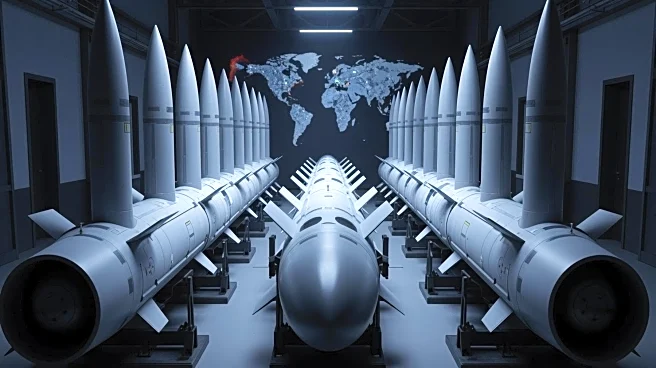What's Happening?
President Trump is contemplating the sale of U.S.-made Tomahawk missiles to Ukraine, a move that could enable Kyiv to conduct long-range strikes deep into Russian territory. This development comes as Ukrainian
President Volodymyr Zelensky prepares for a visit to the White House, where he is expected to discuss the potential acquisition of these missiles. President Trump has indicated that the threat of supplying Tomahawks could pressure Russian President Vladimir Putin to return to the negotiating table. The consideration of missile sales follows Trump's recent diplomatic efforts, including negotiating a peace deal to end the war in Gaza.
Why It's Important?
The potential sale of Tomahawk missiles to Ukraine represents a significant escalation in U.S. involvement in the Russia-Ukraine conflict. If executed, it could alter the strategic balance in the region, providing Ukraine with enhanced capabilities to target Russian infrastructure. This move could also strain U.S.-Russia relations further, as President Putin has warned that such a sale would mark a new stage of escalation. The decision could impact global diplomatic dynamics, with European allies closely watching the developments and potential repercussions on NATO's involvement in the conflict.
What's Next?
President Zelensky's upcoming visit to the White House will likely focus on securing the missile deal and discussing further military support from the U.S. The outcome of these discussions could influence the trajectory of the conflict and diplomatic relations between the involved nations. Additionally, President Trump may engage directly with President Putin to discuss the implications of the missile sale, potentially leading to new negotiations or diplomatic tensions.
Beyond the Headlines
The consideration of Tomahawk missile sales to Ukraine highlights the broader geopolitical implications of U.S. military support in international conflicts. It raises questions about the ethical responsibilities of arms sales and the potential for increased militarization in conflict zones. The decision could also influence domestic political debates in the U.S. regarding foreign policy and military intervention.









